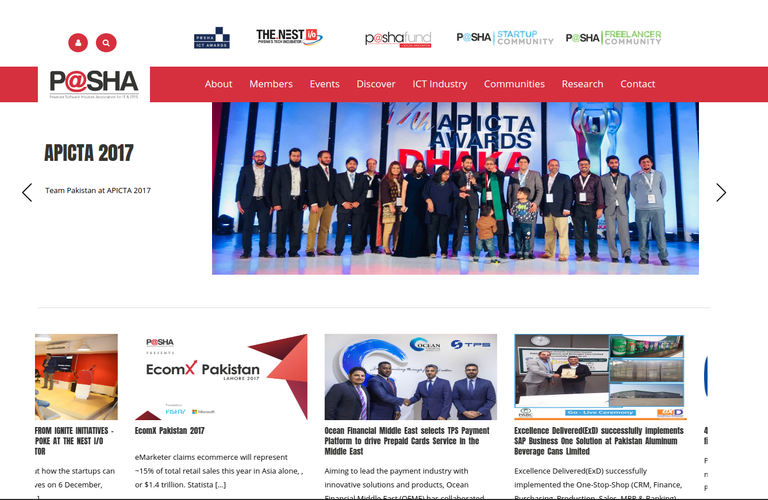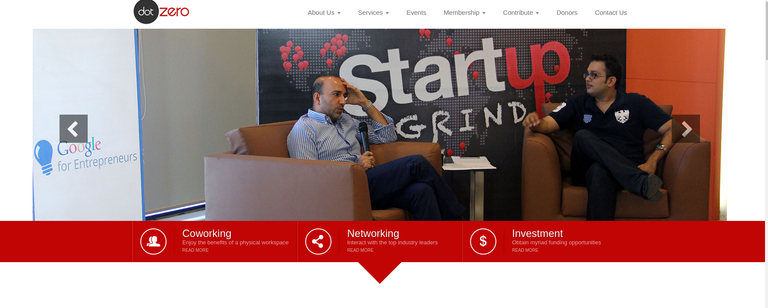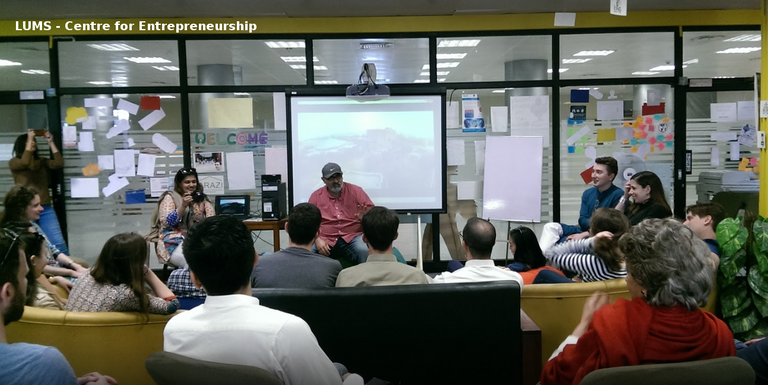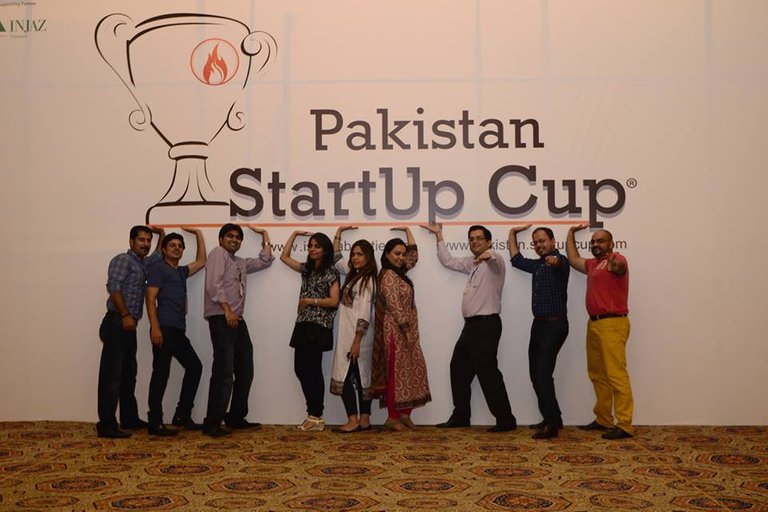The First Steps of the Startups Community
During the first decade of the 21st century, the ecosystem of the tech industry and startups was almost negligible in Pakistan. There was no presence of necessary platforms to provide support for startups in a quick manner. There were only a handful of organizations which were actively working to promote the entrepreneurial spirit and generate startups. Since 2012, however, a very active startup scenery has been growing especially in the cities of Lahore, Karachi and Islamabad. In the same year, the Lahore University of Management Sciences (LUMS) held their first Startup Weekend, an international event supported by Google and other established IT companies. One year later, in 2013, Microsoft held its Windows Phone Hackathon in Lahore bringing together a few dozen young people willing to discuss and exchange ideas regarding their own plans and projects.
In the following years, a positive change in this ecosystem could be observed. Not only new platforms but investors as well have joined Pakistan's startup community in order to help start, promote, and successfully implement new ideas. A clear number of different startups have come forward and made their mark on the national and international level. With the launch of 3G and 4G technology in Pakistan, the trend of online startups increased further on. In 2015, there were several startup platforms, incubators, co-working spaces and tech-hubs to keep the startup trend up and high in the country. The platforms were helped remove barriers which budding entrepreneurs faced in being able to kickstart and successfully run their own startups. One of them is the Pakistan Software Houses Association (P@sha) in Karachi, an organization representing several hundreds of companies and which has contributed to the development of the country´s IT environment since 1992. Through its annual ICT Award competition, P@asha selects - supported by the Punjab Information Technology Board (PITB) - a number of companies and developer groups to represent the country at the regional Asia Pacific ICT Awards. For the P@asha ICT Awards, an increasing number of companies (startups and established) apply to be considered for one of the prizes in more than 30 categories, including security applications, e-health, tourism and project management.

The concentration of expertise at P@asha helps the Pakistani government develop ICT policies that support the sector to grow in the future and, therefore, contribute to the economic growth of the country. From the point of view of the ICT industry, these developments need to improve a lot as there are many issues to be discussed and problems to be solved in order to improve the productivity of the sector. Through its frequent contact with the public sector, P@asha is also able to diplomatically negotiate in moments of tension which are caused at times through online content offending religious groups.
For Pakistan's startup community, P@asha is one of the important actors in the development of new projects although the organization also embraces long established IT giants. However, there are also other spaces with a more exclusive focus on the startup community such as DotZero, a community and co-working space in Karachi offering a physical environment to young IT entrepreneurs and which supports networking and coaching among recently founded companies. DotZero was the only co-working space in Karachi in 2013 after the pioneering Suite 401 had closed down in 2010. The concept of sharing offices with other companies was not very common in Pakistan and the DotZero founders were looked at with a skeptical view from common business owners. However, this changed quickly once DotZero became a major success story followed by new co-working spaces that opened up in the following years.

Startup Incubators
DotZero was even more than a simple co-working space, something that many say is its key to success. It offers not only tables, chairs, an Internet connection and a coffee machine. DotZero is also meant to bring people together to discuss and develop their projects, find partners, supporters, and other like-minded individuals. It is currently the only privately funded incubator in Pakistan and is growing. While DotZero’s initial offerings were a physical room to work in as well as bringing together young entrepreneurs, mentors and angel investors, the company later opened up a new investment platform in cooperation with a number of founding initiatives from Pakistan and abroad. The DotZero Venture platform was initiated in 2015 and has so far invited eight early stage startups from DotZero's preferred sectors being fashion, e-commerce, and technology. Besides receiving financial investment by experienced entrepreneurs, the lucky winners of this DotZero initiative are also invited to use the physical facilities at the Karachi co-working space to develop their projects. Among these first round of winners was Popinjay, an e-commerce startup selling Pakistani craftwork to oversea customers. Popinjay's special approach is its orientation as an ethical fashion label supporting local artisans. Like several individuals involved in Pakistan's startup scene, Popinjay's founder Saba Gul had also spent a couple of years living in the United States of America before she initiated her e-commerce project in Pakistan. Sukoon, another project supported by DotZero Venture connects households with domestic service providers like electricians, plumbers, and painters. Sukoon's CEO and co-founder Shoaib Iqbal, however, notes on his company's website that he has lived in Pakistan all of his life. Sukoon, another project supported by DotZero Venture connects households with domestic service providers like electricians, plumbers, and painters.
Besides DotZero, a number of publicly funded incubators are supporting Pakistan's startup community as well. Among them is Plan9, one of the country's largest incubators started by the Punjab Information Technology Board in 2012. Similar to DotZero, Plan9 is also offering office space plus a number of services like legal support and mentorship to its members. Besides that the organization also has financial resources to offer to up to 30 startups that are annually selected at their events in Karachi, Islamabad, and Lahore. The teams supported by Plan9 are allowed to use its facilities 24 hours a day, 7 days a week. This option is very much supportive of the way many entrepreneurs are used to working. Instead of forcing creativity to pop up between 8 o'clock in the morning and 5 in the afternoon, this next generation of Internet professionals is able to nibble cookies at two in the morning in front of their monitors and then celebrate the solution to their problem once it was found at 3 a.m. with their colleagues, who have also persevered until the late morning. Being a prestigious public sector project Plan9 also has a number of corresponding individuals in its leadership positions, among them its founder Umar Saif. Saif has been a vibrant personality of Pakistan's IT community for many years. Being lucky enough to come from a privileged background he was able to attend the necessary elite educational institutions in Pakistan and Europe before working in the U.S. These career opportunities opened up the necessary doors for him in Pakistan once he moved back and became active in the country's IT and startup scene including the Punjab Information Technology Board and finally, the Plan9 incubator.
A third and very important incubator for startups is LCE, the LUMS Center for Entrepreneurship at the Lahore University for Management Sciences. Inaugurated in May 2014 under the leadership of Khurram Zafar, LCE offers an absolutely diversified program to interested startups from all over Pakistan. Before the institutionalization of the incubator, LCE was already supporting entrepreneurs. However, when LCE opened up its official program line, also known as the Foundation Program, new technical and financial opportunities were created to improve Pakistan´s startup community.

At the basis of the Foundation Program, a fund was created called the Foundation Fund which provides chosen startups with financial support. Investors from the private sector are joining the public sector to invest in the Foundation Fund. These resources are in turn invested in three strings of the Foundation Program that startups can apply for. Separated in incubation cycles of four months, young companies can choose which string fits best to what they are looking for. The difference between the individual program strings is the quantity of services the candidates receive from LCE. The more support they are seeking for, the more they need to invest in shares of their company. The Foundation Program divides into shares of 2.5%, 5% or 7.5% that the companies need to hand over to LCE. Once a startup has decided what program string works best for them they can apply directly via the website of the program by filling in the application forms to join one of the three turns that are selected each year. Depending on the choice of the program string, the selected startups will receive mentoring from experienced business people and be able to access the physical infrastructure they need for their daily routines. Like Plan9, LCE also emphasizes that their protégés will have access to Internet and electricity on a 24-7 basis. Considering the frequency of power breakdowns the country is witnessing, this is an offer many entrepreneurs are happy about. Because LCE is also part of a renowned Pakistani university, the participants of the program also get access to the infrastructure of the university and its network to improve their knowledge on several topics they are looking for. And not to forget, just like other incubators, LCE also provides access to angel investors who are looking for the next big thing on the net. During this four-month program, all startups are requested to give their best to reach all the milestones developed by the team at LCE to bring forward their share of Pakistan's new web companies.

Since the reputation of Pakistan´s early startup community began spreading over several parts of the country, a growing number of especially young entrepreneurs became interested in participating in this new and promising opportunity to start an innovative business online. With an increasing number of Internet users in the country and the possibility to reach customers in other parts of the world, new companies and projects have started popping up all over the country especially in the urban centers contributing to an impressive part in the national GDP. The need for a supportive environment also led the spread of ideas like co-working and incubation initiatives. Besides DotZero, Plan9 and LCE many other similar companies and programs have come up within a time frame of 2-3 years. Among them are PlanX (a governmental initiative to support mid-stage startups), Nest I/O (a community hub in Karachi run by P@asha in cooperation with international partners) and Invest2Innovate (a virtual incubator program with workshops in Karachi and Lahore). Thanks to the local infrastructure provided by all the actors involved and the will of young entrepreneurs to bring change and innovation to the country, Pakistan sees more than 50 new startups coming up every month.
Coming next: Opportunities and Challenges for Investors
Previous postings of this report:
Part 1: Introduction
Part 2: The Big Four of Pakistani Telecommunication
Part 3: New Technologies and Challenges for the Market
Part 4: Pakistan Going Mobile
Part 5: The Mobile Device Industry
Part 6: Getting Connected
Part 7: Selling Online – the E-Commerce Experience